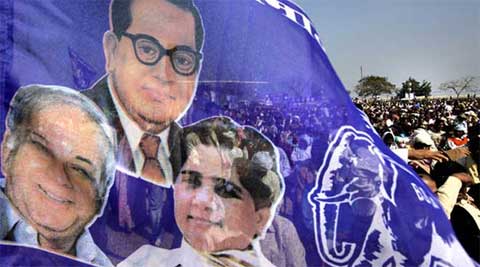Stay updated with the latest - Click here to follow us on Instagram
What does national party status mean?
Election Commission has issued notices to BSP, NCP and CPI asking why their national party status should not be withdrawn.
 The Election commission has sent notice to BSP, NCP and CPI.
The Election commission has sent notice to BSP, NCP and CPI.
Following a drubbing in the Lok Sabha elections, the Election Commission of India has issued show-cause notices to Bahujan Samaj Party (BSP), Nationalist Congress Party (NCP) and Communist Party of India (CPI) asking them why their national party status should not be withdrawn.
What are the conditions for a political party to get recognition as a national party?
A political party becomes eligible to be recognised as a national party if it fulfils any of the three following conditions:
* The party has won 2 per cent of seats in the Lok Sabha (11 seats) from at least three different states in the latest general election.
* In an election to the Lok Sabha or Legislative Assembly, the party has polled 6 per cent of the total valid votes in at least four states, in addition to winning four Lok Sabha seats.
* A party has got recognition as a state party in at least four states.
Once a political party is recognised as a national party, the question of whether it continues to be recognised as such after subsequent Lok Sabha polls depends on whether it fulfils any of the three conditions.
Which parties fall short now?
While the BSP bagged a 4.1 per cent vote share — the third highest after the BJP and the Congress — it failed to secure a single Lok Sabha seat. The NCP, with a vote share of 1.6 per cent, won six Lok Sabha seats — four from Maharashtra alone. With a 0.8 per cent vote-share, the CPI managed to win one seat in the 2014 polls. These parties are likely to seek personal hearings with the EC and argue their cases in a bid to prevent de-recognition as national parties. Sources in the EC, however, told The Indian Express that given the rules, it is highly unlikely that any party not fulfilling the criteria would continue to enjoy the status of a national party.
What is the most important benefit of being recognised as a national party?
Being recognised as a national party means a party is entitled to a reserved symbol for its candidates contesting from across the country. This is critical for political parties since a large section of voters in the country are illiterate and depend on symbols to identify the party they want to vote for. Having a pan-India symbol helps parties reach out to prospective voters.
Are there any other benefits of being recognised as a national party?
Candidates from a national party require only one proposer to file their nominations and are entitled to two sets of electoral rolls free of cost. National parties get dedicated broadcast slots on public broadcasters Doordarshan and All India Radio during the general elections. Further, political parties are entitled to nominate ‘star campaigners’ during general elections. A national party can have a maximum of 40 ‘star campaigners’ while a registered unrecognised party can nominate a maximum of 20 ‘star campaigners’, whose travel expenses are not accounted for in the election expense accounts of candidates.
How many national parties contested the 2014 Lok Sabha elections?
Six political parties — BJP, Congress, CPM, BSP, CPI and NCP — contested as national parties.







